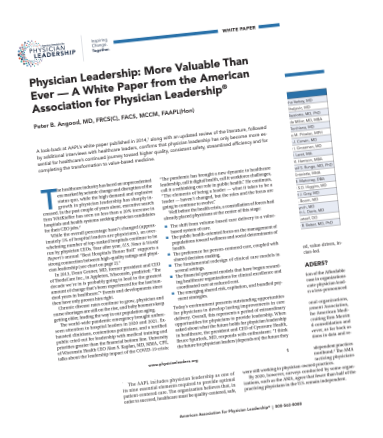
Economics
The Collaboration Imperative: Why Healthcare Executives Must Unite Against an Existential Threat
Peter B. Angood, MD, FRCS(C), FACS, MCCM, FAAPL(Hon), C. Ann Jordan, JD
Healthcare organizations face billions in revenue losses from Medicare cuts, halted value-based care models, and reduced federal funding. Traditional siloed leadership cannot tackle these interconnected challenges. This white paper emphasizes the critical need for integrated CEO-CFO-physician executive collaboration, offering actionable frameworks for building collaborative leadership structures. Executive partnerships and physician leadership development drive superior outcomes, financial sustainability, and competitive advantage in a transformed healthcare landscape.
Influence
“Profiles in Success”: Certified Physician Executives Share the Value and ROI of their CPE Education
Peter B. Angood, MD, FRCS(C), FACS, MCCM, FAAPL(Hon)

AAPL believes physician leaders who are pursuing leadership education and training — and the organizations that are supporting their effort — should be able to clearly see the value of their time, money, and effort.
Influence
Championing Physician Leadership Development: AAPL's Five-Decade Commitment Meets Healthcare's Critical Moment
Peter B. Angood, MD, FRCS(C), FACS, MCCM, FAAPL(Hon)

From closing knowledge gaps in finance and AI to building emotional intelligence and peer communities, the future of healthcare demands bilingual leaders fluent in both medicine and strategy.
Technology Integration
AI Doesn’t Reduce Work—It Intensifies It
Aruna Ranganathan, Xingqi Maggie Ye
One of the promises of AI is that it can reduce workloads so employees can focus more on higher-value and more engaging tasks. But according to new research, AI tools don’t reduce work, they consistently intensify it.
SoundPractice
The Hidden Costs of Generative AI: What Healthcare Leaders Need to Know
Hugo Huang

Dive into the financial realities of adopting generative AI in healthcare! Join Mike Sacopulos and expert Hugo Huang for insights, strategies, and pitfalls leaders must navigate in this transformative landscape.
Self-Awareness
Certified Physician Executive (CPE)
Pamela C. Sullivan, MD, MBA, CPE, FACP, FCUCM, PT
The Certified Physician Executive (CPE) by AAPL enhances leadership skills for physicians through a flexible, self-paced program, complementing MBA knowledge.

Trust and Respect
A Metaphor for a Happy Marriages?
Deborah M. Shlian, MD, MBA
Happy marriages mirror pairs figure skating: built on trust, strength, grace, communication, and resilience, they require practice, recovery, and adapting together over time.

New Book
Career Prescription Guide: A Physician's Guide for Career Transformation or Advancement
Pamela C. Sullivan, MD, MBA, CPE, FACP, FCUCM, PT
This guide empowers physicians to navigate career transitions with confidence, align decisions with values, prevent burnout, and achieve fulfillment.

A Clinical Care Pathway to Provide Value-Based Care to Patients Hospitalized with CHF, COPD, and Pneumonia
Measuring Leadership Growth: Metrics as a Part of Physician Leadership Development
RN to MD Transition: The Road Less Traveled
Life Is More Than Living
The Art of Suffering
Leonardo, Dragonflies, and Observation
Self-Awareness
The Art of Suffering
Jennifer K. Clark, MD, Michael J. Sacopulos, JD
Dr. Jennifer Clark discusses suffering in healthcare, her career shift to medicine, and insights from her book, promoting compassionate, community-based care.

Self-Awareness
Life Is More Than Living
Evangelyn C. Alocilja, PhD
A woman’s journey from poverty to pioneering biosystems engineering showcases faith, perseverance, and innovation, advancing global health in underserved communities.

Performance
Leonardo, Dragonflies, and Observation
Neil Baum, MD

This article highlights the decline in doctors' observational skills because of technology and explores ways to improve observation for better patient care.
Critical Appraisal Skills
The Founder and CEO of Prologis on Staying Ahead of Disruptive Change
Hamid Moghadam
Over the past four decades, Prologis has grown into the world’s largest real estate investment trust (REIT), with $215 billion in assets under management and 6,000 properties. A core driver of that success has been the company’s ability to anticipate change, from the rise of e-commerce and automation in the early 2000s to increasing demands for services, energy, and data centers more recently. To do that, Prologis has followed a simple playbook: Listen to customers, position yourself to act, experiment, and then invest.
Technology Integration
Manage Your AI Investments Like a Portfolio
Faisal Hoque, Erik Nelson, Thomas H. Davenport, Paul Scade
Companies should apply a step-by-step portfolio management approach when it comes to AI. They should view the connected portfolio through a dual lens: first, as an advancement pipeline with clear gates through which projects must pass; and second, as a whole-portfolio dashboard that shows balances across risk/return, time horizon, capability areas, and mission alignment. This dual perspective enables both rigorous project-level discipline and strategic portfolio-level optimization.


